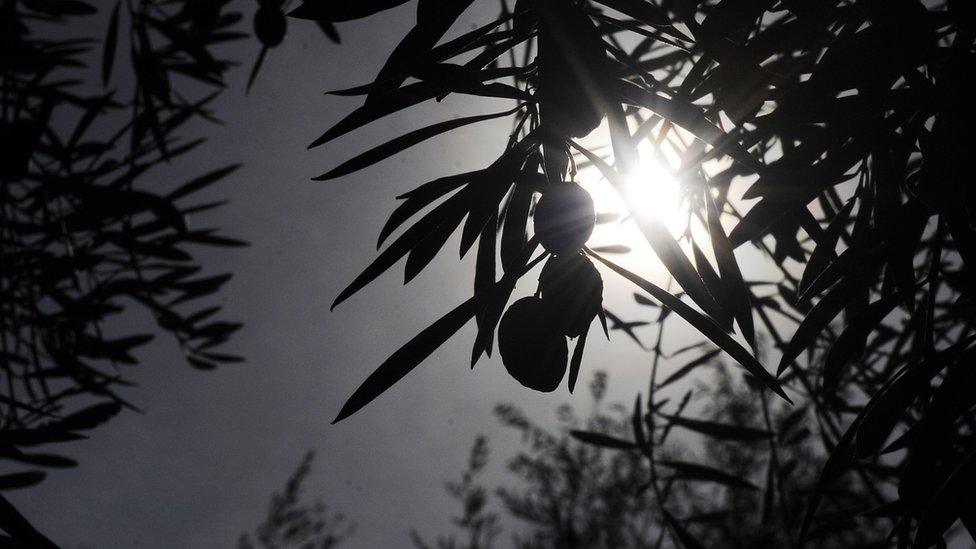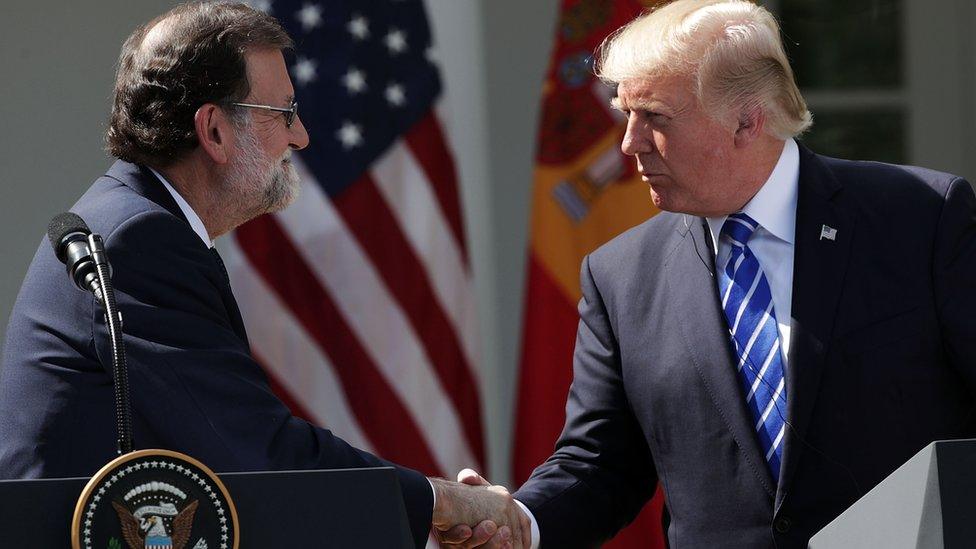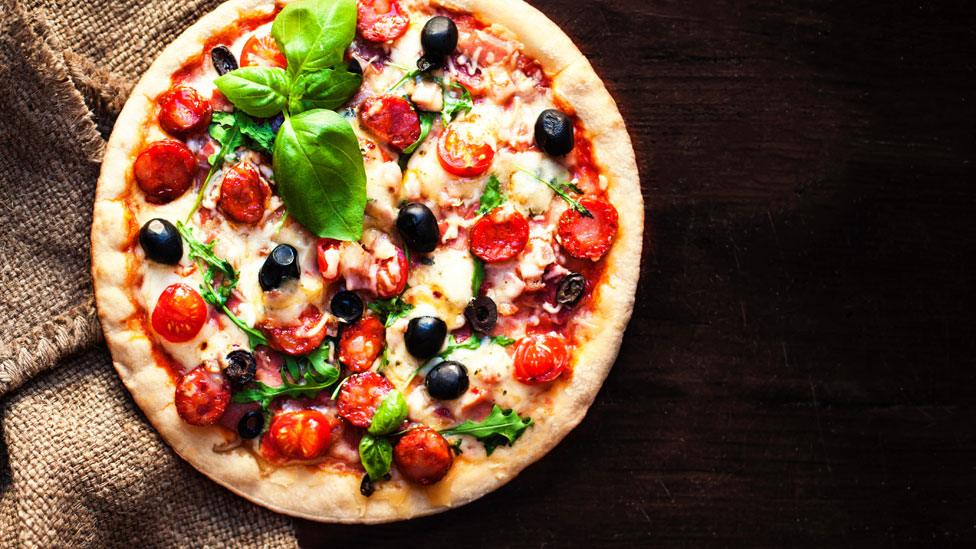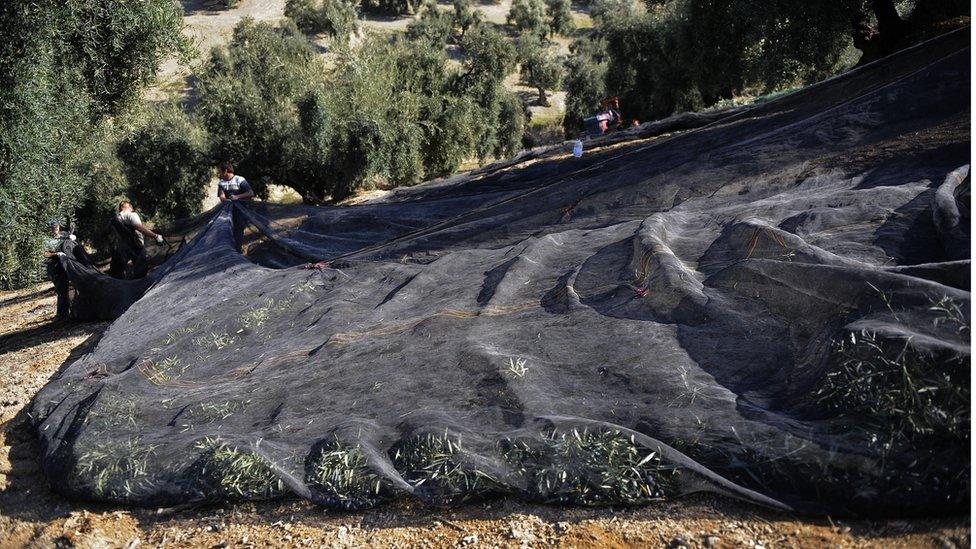US olive farmers pitted against Spaniards
- Published

Donald Trump had welcoming words for Spain's prime minister, Mariano Rajoy, at the White House. But behind the scenes, US aides got ready to battle Spaniards over olive prices.
President Trump touched Rajoy on the arm as they walked to a small stage in the Rose Garden. Trump spoke warmly about friendship between the two countries - and about trade. He also had a warning.
"It must be fair," he said, describing the trade relationship between the US and Spain. "And it must be reciprocal."
Trump's words showed that it's not easy for other world leaders to deal with him - and particularly when it comes to the issue of trade.
As president, Trump has promised to help US workers, making them his number one priority.
During the election and afterwards, he was sceptical of trade deals and said that other countries were taking advantage of the US. His concerns about fair trade relations extend to Europe.
California olive growers recently took him up on the offer to help US workers and make sure they're not getting played. They said that Spanish olive growers were given unfair government subsidies that allowed them to undercut US olives.
According to two California companies, Bell-Carter Foods, Inc and Musco Family Olive Co, the Mediterranean olive growers have been dumping their products on the US market, offering them at a price below the cost of US production.
The company executives said the cost of the Spanish olives was 70% or more below market value.

In July, Wilbur Ross, the US commerce secretary, announced an investigation into whether the producers of Spanish olives received unfair government subsidies.
The fight over the Mediterranean olives reflected a larger conflict between Trump's America First doctrine - and the rest of the world.
In November, the US officials will announce a preliminary decision based on their findings into olive sales. Afterwards they could impose duties on the Spanish olives and level the playing field.
That might mean more of the olives consumed in this country would be made not in Spain - but here.
Regardless of the outcome, one thing is clear - people in both the US and in Europe wonder how trade relations will continue under the Trump administration.
Vincent Smith, a professor at Montana State University in Bozeman who grew up in Leeds, compared the president's philosophy about trade to 18th Century mercantilism: "He wants lots of quids and doesn't want to give any pros."
EU officials are worried - and have been looking at ways to develop new trade agreements with other countries. They have been negotiating a trade agreement with Japan, for example.
"The Europeans have responded to Trump's rhetorical shift to protectionism by signalling their commitment to open trade," said the Council on Foreign Relations' Brad Setser, a former deputy assistant secretary of the US treasury.
Still it's unclear what will come out of the US olive investigation - and whether duties will be imposed.
The US investigators are focusing on a category called "ripe olives," which includes the sliced black olives that are served in salads, pizza and subway sandwiches.

The provenance of olives on American pizza could change
Most of the world's olives, "daylight packed in treasuries of oil," as poet AE Stallings describes them, come from the Mediterranean.
In 2016, according to the US commerce department, the US imported about $70m of olives from Spain - up from about $62m the previous year.
It's possible that the imports of Spanish olives will continue to grow - as they have in the past.
Adin Hester was an owner of an olive orchard in Calavaras County, California, in the 1990s and is now president of the Olive Growers Council of California, which is located in Cloverdale.
He looks back fondly on his days as an olive farmer, recalling the "silvery cast" of the trees and how they looked in the field.
"You'll see a lot of beauty in an olive tree," he says. He says he hopes that duties will be imposed on the Spanish olives.
"If we can't do something to slow down the onslaught of foreign olives, growers will go away," he says, referring to farmers in the US.
Trump once called the North American Free Trade Agreement Administration (Nafta) the "worst trade deal in the history of the world". Today, however, US officials are negotiating with Mexicans and Canadians, and the agreement is likely to remain.
"The president came in saying he was going to do all this stuff," said Eurasia Group's David Gordon, a former director of policy planning at the US state department. "But if you look at the record, there's not a lot of 'there' there."
In the case of olives, the controversy taps into resentment that people in the US have towards the European Union's policy on agriculture.

Spanish olive farmers use nets to harvest olives
The European policy, says Bruce Hirsh, a former assistant US trade representative, has "always been a thorn in the side of US agricultural producers".
The EU's common agricultural policy was once ridiculed because of its lavish subsidy system - farmers produced more than they could sell, creating butter mountains and wine lakes suitable for Paul Bunyan, a lumberjack in US folklore. Many people in the US thought that European subsidies have been unfair to the US farmers.
Trump has complained about the Europeans, accusing them of cheating US workers. But he often says harsh things about people and then forgets he said them.
He spoke in a friendly manner with Rajoy in the garden, and they shook hands three times. That afternoon, problems over trade - and olives - seemed like a thing of the past.
Follow @Tara_Mckelvey, external